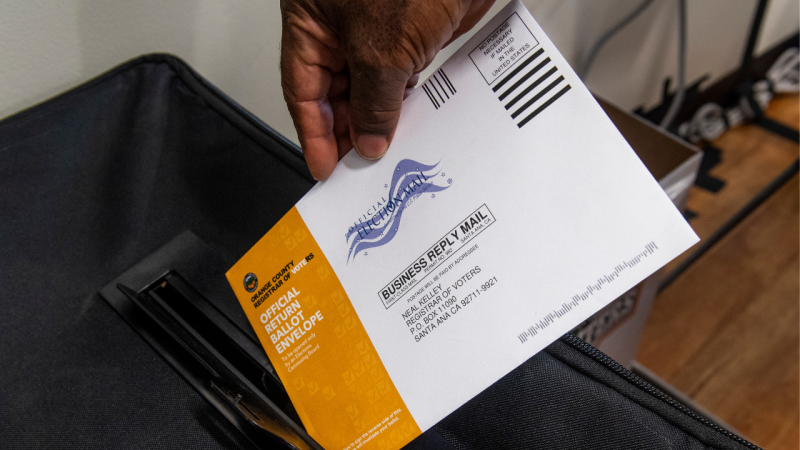In less than a week, millions of Americans will vote in local, state, and federal elections that will determine which party controls the halls of Congress and key governor offices.
Any U.S. citizen over the age of 18 can vote on November 8, except for individuals convicted of a felony, although certain states such as California and Vermont do allow felons to vote once they’re out of prison. Currently, Democrats have a thin majority in the Senate and House, with the vice president usually having to preside as the tie-breaking vote.
Almost all states require voter registration usually a month or so before Election Day, while others allow citizens to register on November 8. The COVID-19 pandemic, as well as new voting laws in certain states, now offer different options for voters. California, Colorado, Hawaii, Nevada, Oregon, Utah, Vermont and Washington automatically send every voter a ballot. However, some states require individuals to provide an excuse for voting early by mail. Moreover, there are national campaigns across the country encouraging more people to vote in this upcoming election. Voter turnout is considered a necessity in most functioning democracies in the world.
The stakes are even higher as all 435 seats in the House of Representatives are up for a vote. The House is considered the most democratic chamber of Congress because every member must be voted in against every two years.
During this midterm election, 34 states will hold Senate elections, but only a handful of states will decide which party holds a majority in the chamber, including Arizona, Pennsylvania, Georgia, New Hampshire, Ohio, and Wisconsin. Regardless, every vote is significant when it comes to gubernatorial, local, and House elections. Over the last 15 midterm elections, an incumbent president’s political party, in this case the Democrats, have majorities thirteen times in the House and nine times in the Senate.
Young college-aged Americans are one of the least likely groups in the country to turn out on Election Day. However, groups such as RockTheVote and other nonprofits actively encourage all Americans over the age of 18 to vote in upcoming elections.
What are the most important states to vote in?
If current political forecasts and polling are accurate, Republicans will likely flip enough seats in the House to regain a majority. However, only a few key states will determine which party regains or keeps the majority of the Senate. If Republicans are able to regain a majority, it will make it difficult for President Joe Biden to pass any legislation on his agenda after 2022, before the 2024 presidential election. However, each of these elections has either the Republican or the Democrat ahead or behind with the margin of error; therefore, every vote will be meaningful in those races.
In Arizona, Blake Masters, a protégé of billionaire Peter Thiel, is running against incumbent Democratic Sen. Mark Kelly. Currently, according to Real Clear Politics, Kelly holds a 2.5%, but recent polls have shown that the race is tightened, and the Cook Political Report recently switched Arizona’s Senate race from ‘lean Democrat’ to ‘toss up.’ A victory for the GOP in this state would almost ensure the party regains a majority over the Democrats in the Senate; therefore, every registered voter will be meaningful in this election.
Georgia also has a close race between former NFL athlete Herschel Walker and incumbent Democratic Senator Raphael Warnock. Both candidates have been marred by personal controversies, and the difference between the pair is within the margin of error, meaning it will likely go to a runoff. Less than a week before the election, Walker leads the incumbent Democrat by 1.6%, according to RealClearPolitics average of all polls in the race. A loss for Democrats in this election would likely push Republicans across the finish line to take back the Senate.
What is the voter turnout in the US?
Turnout in recent elections has increased, especially in the 2018 midterm and 2020 presidential elections. However, the United States will likely still trail many other developed nations in terms of voting-age population turnout, according to the Pew Research Center. The United States is still only ranked 31st out of 49 other countries among the voting-age population.
Why do fewer people for in the midterm election?
Typically, midterm elections have a lower voter turnout when compared to the presidential election years. This has been chalked up to a number of reasons, such as less voter interest in Congressional races compared to widely covered presidential elections. In some instances, even politically aware voters sometimes do not vote in the midterm cycle because it does not involve the president. The RNC and DNC are aware of this issue and actively work to bring more voters from their side out during this period to increase their party’s power.
‘Voter turnout regularly drops in midterm elections, and has done so since the 1840s,’ writes Pew Research Center senior writer Drew DeSilver. ‘In 2008, for instance, 57.1% of the voting-age population cast ballots — the highest level in four decades — as Barack Obama became the first African American elected president. But two years later only 36.9% voted in the midterm election that put the House back in Republican hands. For Obama’s re-election in 2012, turnout rebounded to 53.7%.’

